The third and final day of LIFT Forum 2019 launched LIFT strategy 2019-2023 that will focus on inclusion and social cohesion, increasing support to areas affected by conflict, and bringing displaced people into development programmes. Activities included speeches, question & answer sessions and perspectives from donors in order to explore upcoming challenges and opportunities for LIFT in Myanmar. Some of the main topics of discussion were civil society, gender, migration and climate change.
What are some of the main current challenges?
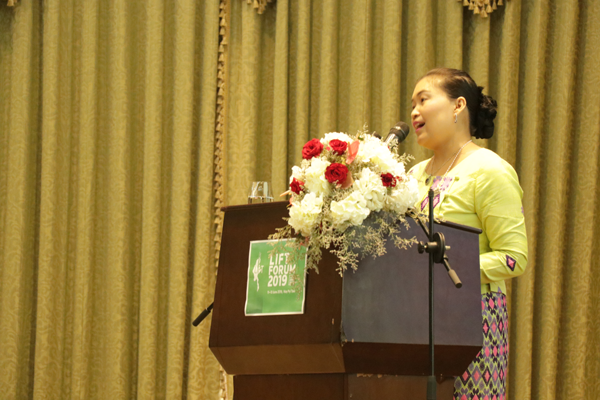 Problems in Myanmar transpire in many aspects of society. Daw Lahpai Seng Raw, co-founder of the Metta Development Foundation and Airavati, made the case for strengthening civil society in the country. Daw May Sabe Phyu, Director of the Gender Equality Network, spoke of how women, often due to cultural and religious norms, are not given the same opportunities as men in fields such as politics, employment, inheritance, and education. Reverend Saw Matthew Aye, Founder and Director at the Karen Development Network, also spoke of low awareness about the situations for refugees and internally displaced persons in Myanmar, therefore making it difficult to provide recovery, rehabilitation and relief. Furthermore, Ms Reiko Harima, Regional Coordinator of the Mekong Migrant Network, addressed the issue of heavy internal and unregulated migration of people leaving cities unprepared, which leads to informal settlements, lack of access to piped water, and more.
Problems in Myanmar transpire in many aspects of society. Daw Lahpai Seng Raw, co-founder of the Metta Development Foundation and Airavati, made the case for strengthening civil society in the country. Daw May Sabe Phyu, Director of the Gender Equality Network, spoke of how women, often due to cultural and religious norms, are not given the same opportunities as men in fields such as politics, employment, inheritance, and education. Reverend Saw Matthew Aye, Founder and Director at the Karen Development Network, also spoke of low awareness about the situations for refugees and internally displaced persons in Myanmar, therefore making it difficult to provide recovery, rehabilitation and relief. Furthermore, Ms Reiko Harima, Regional Coordinator of the Mekong Migrant Network, addressed the issue of heavy internal and unregulated migration of people leaving cities unprepared, which leads to informal settlements, lack of access to piped water, and more.
What are the challenges of tomorrow?
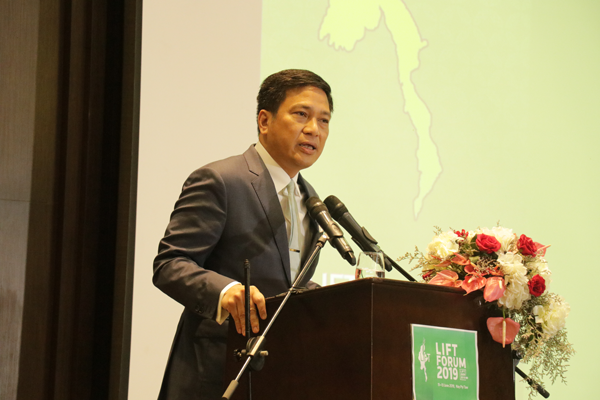 A matter that came up on several occasions during the day’s speeches was climate change. Dr Thomas Reardon, Leading Global Economist and Professor of Agricultural, Food and Resource Economics at Michigan State University, delved into the effects climate change has on farmers, and how farmers can be more climate-resilient. Historian and author Dr Thant Myint-U noted that Myanmar is one of the world’s most vulnerable countries to climate change and that the consequences will be catastrophic.
A matter that came up on several occasions during the day’s speeches was climate change. Dr Thomas Reardon, Leading Global Economist and Professor of Agricultural, Food and Resource Economics at Michigan State University, delved into the effects climate change has on farmers, and how farmers can be more climate-resilient. Historian and author Dr Thant Myint-U noted that Myanmar is one of the world’s most vulnerable countries to climate change and that the consequences will be catastrophic.
What did the donor representatives say?
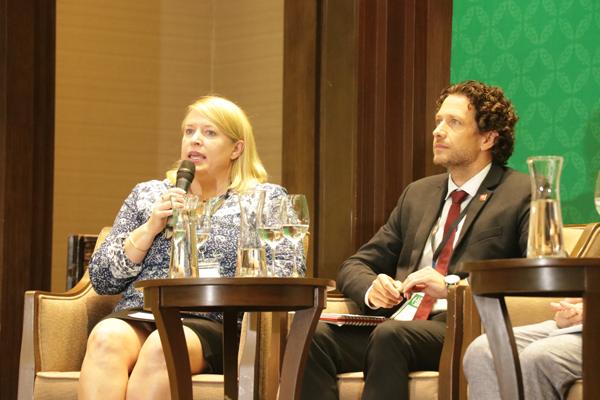 Dr Johann Hesse, Head of Cooperation at the Delegation of the European Union to Myanmar, expressed a wish that LIFT remains flexible and focused, as Mr Markus Bürli, Deputy Head of Cooperation at the Embassy of Switzerland and Ms Vanessa Hegarty, First Secretary of the Australian Department of Foreign Affairs and Trade emphasised the importance of working in conflict-affected areas and supporting civil societies. Ms Pamela Fessenden, Deputy Mission Director of the United States Agency for International Development, spoke of the benefits of partnering with the private sector, and Mr Pete Howson, Livelihoods Advisor at the UK Department for International Development UK, voiced a strong interest in devising climate-smart strategies.
Dr Johann Hesse, Head of Cooperation at the Delegation of the European Union to Myanmar, expressed a wish that LIFT remains flexible and focused, as Mr Markus Bürli, Deputy Head of Cooperation at the Embassy of Switzerland and Ms Vanessa Hegarty, First Secretary of the Australian Department of Foreign Affairs and Trade emphasised the importance of working in conflict-affected areas and supporting civil societies. Ms Pamela Fessenden, Deputy Mission Director of the United States Agency for International Development, spoke of the benefits of partnering with the private sector, and Mr Pete Howson, Livelihoods Advisor at the UK Department for International Development UK, voiced a strong interest in devising climate-smart strategies.
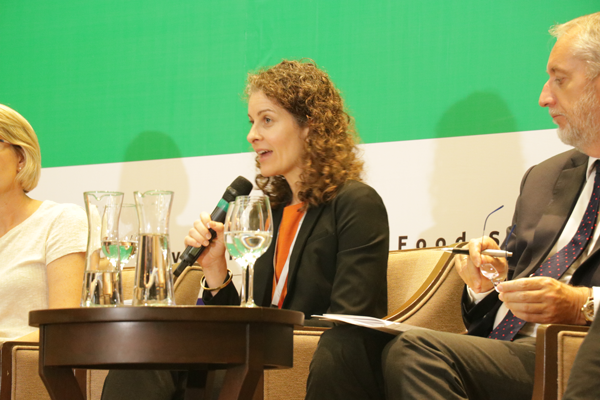 Finally, Ms Heather McBride, First Secretary of Global Affairs Canada at the Embassy of Canada, concluded saying that LIFT’s five-year strategy is an exciting contribution to a much longer-term plan, and LIFT represents the cumulative achievements of work carried out through successful partnerships.
Finally, Ms Heather McBride, First Secretary of Global Affairs Canada at the Embassy of Canada, concluded saying that LIFT’s five-year strategy is an exciting contribution to a much longer-term plan, and LIFT represents the cumulative achievements of work carried out through successful partnerships.

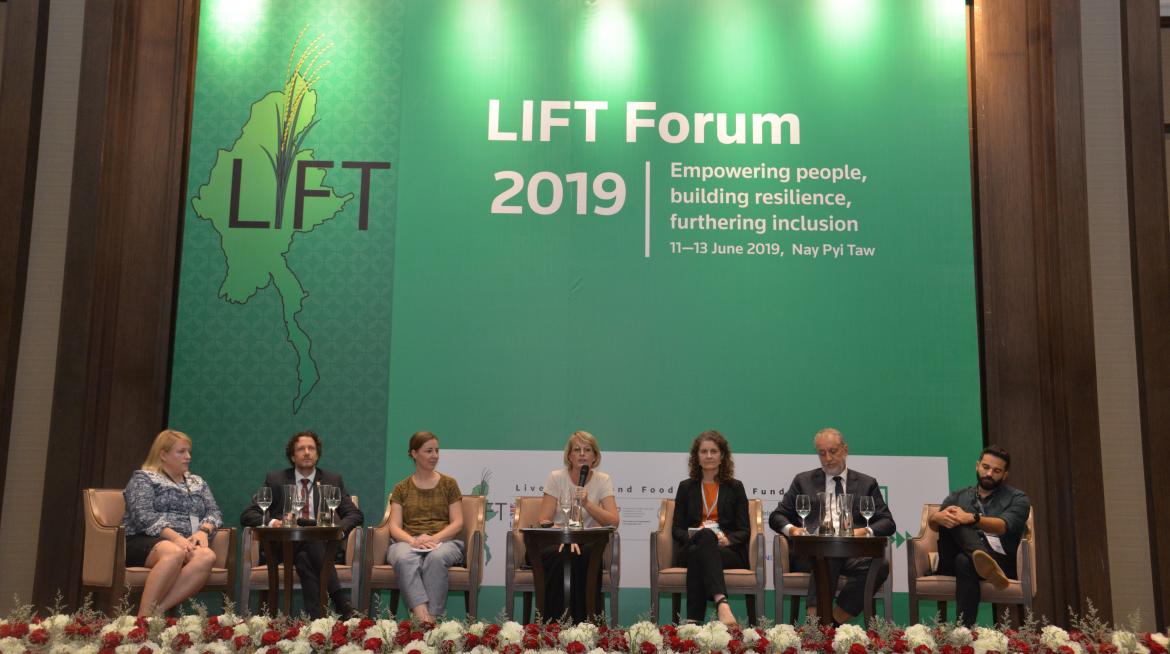

 A matter that came up on several occasions during the day’s speeches was climate change. Dr Thomas Reardon, Leading Global Economist and Professor of Agricultural, Food and Resource Economics at Michigan State University, delved into the effects climate change has on farmers, and how farmers can be more climate-resilient. Historian and author Dr Thant Myint-U noted that Myanmar is one of the world’s most vulnerable countries to climate change and that the consequences will be catastrophic.
A matter that came up on several occasions during the day’s speeches was climate change. Dr Thomas Reardon, Leading Global Economist and Professor of Agricultural, Food and Resource Economics at Michigan State University, delved into the effects climate change has on farmers, and how farmers can be more climate-resilient. Historian and author Dr Thant Myint-U noted that Myanmar is one of the world’s most vulnerable countries to climate change and that the consequences will be catastrophic. Dr Johann Hesse, Head of Cooperation at the Delegation of the European Union to Myanmar, expressed a wish that LIFT remains flexible and focused, as Mr Markus Bürli, Deputy Head of Cooperation at the Embassy of Switzerland and Ms Vanessa Hegarty, First Secretary of the Australian Department of Foreign Affairs and Trade emphasised the importance of working in conflict-affected areas and supporting civil societies. Ms Pamela Fessenden, Deputy Mission Director of the United States Agency for International Development, spoke of the benefits of partnering with the private sector, and Mr Pete Howson, Livelihoods Advisor at the UK Department for International Development UK, voiced a strong interest in devising climate-smart strategies.
Dr Johann Hesse, Head of Cooperation at the Delegation of the European Union to Myanmar, expressed a wish that LIFT remains flexible and focused, as Mr Markus Bürli, Deputy Head of Cooperation at the Embassy of Switzerland and Ms Vanessa Hegarty, First Secretary of the Australian Department of Foreign Affairs and Trade emphasised the importance of working in conflict-affected areas and supporting civil societies. Ms Pamela Fessenden, Deputy Mission Director of the United States Agency for International Development, spoke of the benefits of partnering with the private sector, and Mr Pete Howson, Livelihoods Advisor at the UK Department for International Development UK, voiced a strong interest in devising climate-smart strategies.  Finally, Ms Heather McBride, First Secretary of Global Affairs Canada at the Embassy of Canada, concluded saying that LIFT’s five-year strategy is an exciting contribution to a much longer-term plan, and LIFT represents the cumulative achievements of work carried out through successful partnerships.
Finally, Ms Heather McBride, First Secretary of Global Affairs Canada at the Embassy of Canada, concluded saying that LIFT’s five-year strategy is an exciting contribution to a much longer-term plan, and LIFT represents the cumulative achievements of work carried out through successful partnerships.
